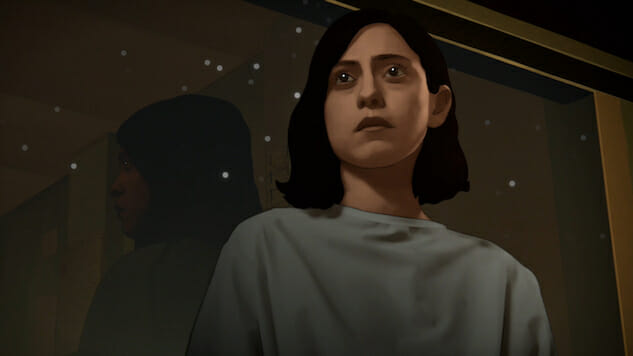Undone: Amazon’s Beautiful, Strange New Series Is Ambitious to a Fault
Photo Courtesy of Amazon
Loops, quantum entanglement, and a lot of screwed-up people: Time travel shows have fully embraced the inverse relationship between narrative linearity and character troubles. The latest to do so is Undone, the rotoscoped Amazon series from BoJack Horseman creators Kate Purdy and Raphael Bob-Waksberg. It’s not just nonlinear—it’s antilinear. Linear storytelling is antithetical to its entire premise, as embracing atypical perception is its goal. The diverse (and neurodiverse) experiences of its characters—told through immigrant stories, multicultural backgrounds, and yes, those that can screw with the timeline—exist to create a message of complicated inclusion that makes the bold yet repetitive show completely unique. Thankfully, it’s also visually exciting enough to sustain most of its philosophical musings, with a central character charming enough to shoulder some head-shaking misfires.
I got to see the first five half-hour episodes (a welcome rarity for a weird, heady drama), in which director Hisko Hulsing and an animation team—including those behind the outstanding documentary Tower—provide the same kind of dreamy visuals that served Richard Linklater’s Rotoshopped Waking Life and A Scanner Darkly so well. Rotoscoping gave the Austin slacker’s stories a psychedelic veneer, but Undone feels animated at its core, so dedicated to its visual strangeness that the silliness of its own bong-rips-at-midnight complexity could almost feel tongue-in-cheek if the subject matter wasn’t so tragic.
Earlier this year, Netflix’s Russian Doll set a standard for mindbending black comic genre fare by doing familiar time travel tropes cleverly, and with an emotional bedrock beneath it all. Both that show and Undone feature a sarcastic female lead and strong central traumas which are strictly related to the temporal instability. In the latter’s case, the character is far stronger than the sum of her emotional journeys. Alita: Battle Angel’s Rosa Salazar plays Alma, a small-scale rebel—one who wouldn’t feel out of place in a Linklater film—who has a brush with death in a car accident. Afterwards, the ordinarily strict workings of time play hooky and she sees her dead dad (Bob Odenkirk) appear before her. He goes full Hamlet and tells her that he was actually murdered. Of course, Alma is the only one who can set things right thanks to her special abilities.
It’s a strange story, and it only gets stranger as we follow Alma down the rabbit hole. The characters, which include Alma’s sister Becca (Angelique Cabral) and mom Camila (Constance Marie) alongside her ghost pop’s existential Yoda (there’s even a “there is no ‘try’” moment), are more coherent than the tale they’re telling, which is the only way a show that’s attempting to be mysterious but not cliffhanger-y can keep you watching.
Salazar (who has a knack for being partially animated) is exceptionally expressive, which is perhaps why she’s being sought for these projects. She’s able to communicate sarcasm, reproach, disgust, and reluctant affection with an eye roll. That nuance is hard for an actor to project and harder to capture with a camera, though Mary Elizabeth Winstead is particularly good at this, and that’s who Salazar channels here. A little heightened cartoonishness ironically allows the actors—Salazar especially—to be more realistic (and endlessly GIF-able).
Odenkirk is equally good at delivering long bits of complicated metaphysical nonsense and being utterly untrustworthy. As soon as he shows up to convince Alma that she needs to help him solve his own murder and hone her abilities, we’re thinking “Ok, this guy is totally using her.” But it’s not just her dad. The men in her life are presumptuous, gaslighting, and overbearing, including her boyfriend Sam (Siddharth Dhananjay, who deserves way more work after his breakout turn in Patti Cake$) and her co-worker played by Daveed Diggs.
-

-

-

-

-

-

-

-

-

-

-

-

-

-

-

-

-

-

-

-

-

-

-

-

-

-

-

-

-

-

-

-

-

-

-

-

-

-

-

-








































